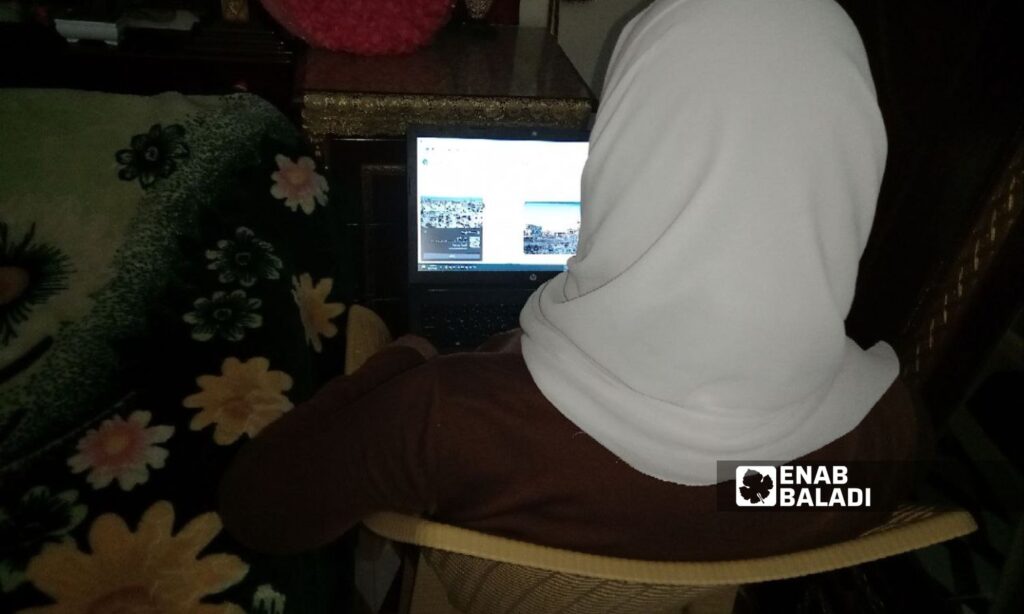Daraa – Halim Muhammad
The 30-year-old Mahmoud needs 100,000 Syrian pounds for an internet package every month after Syriatel and MTN raised the prices of their packages.
He has no choice but to pay for the package, although there are possible solutions to save money, which are landline telephone gateway networks, but it is a limited option linked to certain areas for reasons related to the theft of optical cables and the company’s inability to continue to compensate for the loss of them.
Internet via the landline phone network is characterized by its cheapness, as the price of a package with 4 GB speed is 32,000 Syrian pounds per cycle (every two months).
The US dollar is trading at 14,400 SYP according to the S-P Today website, which covers the trading rate of the Syrian pound to the dollar.
Mahmoud, of Zayzoun town in the western countryside of Daraa, told Enab Baladi that one package for each mobile phone is equivalent to three times the landline package, pointing out that he began to avoid watching video recordings on YouTube and search engines to ensure that the package lasts a longer period.
The Telecommunications and Postal Regulatory Commission, affiliated with the Ministry of Communications in Syria, issued a decision to raise the prices of cellular, fixed-line, and Internet communications services, effective from the beginning of last November.
There was an increase of between 25% and 35% in the basic tariff for cellular communications services and 30% in the tariff for fixed communications and Internet services.
Minutes after the Commission published its decision, the two telecom companies operating in Syria, MTN and Syriatel, announced the new price list. The price of a cellular minute for prepaid lines reached 47 Syrian pounds and 45 Syrian pounds for postpaid lines, and the price of a megabyte outside the packages reached 27 Syrian pounds.
Areas not covered by landline Internet
In light of the high cost of the Internet, residents are looking for less expensive alternatives. The idea of portals is good but difficult to implement, as it requires a huge budget in Daraa due to the distance of the rural areas from each other, amid the sagging government institutions and their inability to provide the simplest services.
Before 2011, Zayzoun town was connected to the Tal Shihab telephone center, but the main lines were stolen, which made reconnecting the town’s telephone network expensive.
Ammar, of Tal Shihab, whose center is fed by the Internet of the telephone network gateways, said that despite the weakness of the Internet, the terrestrial Internet option remains economical compared to the prices of satellite Internet and the Syriatel and MTN packages.
The 24-year-old man stated that his home is satisfied with one package per month that can be renewed during the second month of the cycle, but if the family wanted to rely on other means of communication, its need would have been equivalent to 500,000 pounds per month.
Mohammad al-Mekdad, 38, based in Busra town, which is also covered by landline Internet gateways, told Enab Baladi that the Internet is somewhat weak due to the telecommunications regulatory company setting speeds at 4 gigabytes, while speeds reach 24 gigabytes, but they are designated for administrative offices and some companies.
Al-Mekdad added that landline Internet has become an important alternative after the rise in package prices, and although the General Telecommunications Company is profiteering, it is not working to improve services, as the Internet is cut off at nine in the evening due to the communication switchboard’s batteries running out of charge, and the company is supposed to supply the switchboard with fuel to ensure continuous operation.
Cable theft prevented access
After the Russia-brokered security settlement in July 2018, which ended with the regime taking control of Daraa governorate, the state-run Telecommunications Company worked to restore some switchboards and some main cables, but they were subjected to theft, which prompted the company to abandon providing the service.
Ahmed, 30, of Jalin town in the western countryside, said that the telecommunications company began in 2020 to restore the telephone switchboards in the town, and during the work, the main optical cable feeding the switchboards was stolen, which prompted the company to stop work.
Ahmed added that a few thieves deprived an entire town of a service that would save them from paying large sums of money in light of the deteriorating living conditions.
A member of a local committee in al-Harak town in the eastern countryside (a committee that supervises the implementation of services independently of the regime’s municipality) said that the thefts halted the restoration of the town’s switchboard and that the telecommunications company asked the notables for a pledge to protect the lines from theft.
The member (who requested to remain anonymous for security reasons) continued that the large number of thefts prompted the notables not to submit the pledge.
The main cables were stolen more than once in the town of Tal Shihab in the western countryside of Daraa, and the telecommunications company issued a warning to the town’s notables to cut off service if the theft operations continued, which prompted the notables to form protection groups from the town’s residents and dig tunnels to fill in some of the landlines.
The theft operations led to the suspension of service to the Daraa camp despite its proximity to the center of Daraa city.
With the thefts, lack of services from government institutions, and the absence of deterrent authority, residents lost access to the Internet, which began to crowd out food and clothing expenses.











